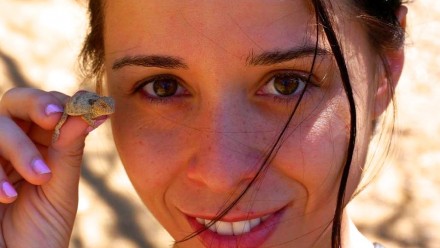Role of behaviour in evolutionary diversification
Martha Muñoz
A lizard's behaviour has the potential to expose it to selection, thereby impelling evolution, or to shield it from environmental variation, which can preclude evolution.
Dr Martha Muñoz is working at the intersection of ecology and evolution to investigate the role of lizard behaviour in evolutionary diversification.
In particular, Martha is interested in how lizards interact with their environments, and how such behaviours influence the selective pressures that they experience.
Behaviour has the potential to expose organisms to selection, thereby impelling evolution ('behavioral drive') or to shield them from environmental variation, which can preclude evolution ('behavioral inertia' or the 'Bogert Effect').
Martha's reserach has focused on conceptually unifying these two concepts by simultaneously considering the effects of behavior along distinct niche axes.
She has found that behavioral shifts for thermoregulation can have drastically different evolutionary consequences for lizard physiology and morphology, thus mechanistically linking behavioral drive and behavioral inertia.
Martha is currently a Postdoctoral Fellow in the Moritz Lab at ANU. She is expanding on her previous work by examining the multidimensional consequences of behavioral thermoregulation in Rainbow skinks (Carlia spp.) from northern Australia.
Some species of Carlia have ranges that extend from relatively buffered coastal habitats to dry, hot, and unpredictable habitats in the continental interior.
By examining behavioral thermoregulation and physiological acclimation along a dramatic climate gradient, she is testing how Carlia contend with severe climatic conditions, and whether behavioral shifts in response to temperature is leading to correlated evolution in other organismal traits.
Martha is also working on understanding patterns of trait evolution across climatic gradients to better understand the origin and maintenance of lizard biodiversity in tropical regions.









